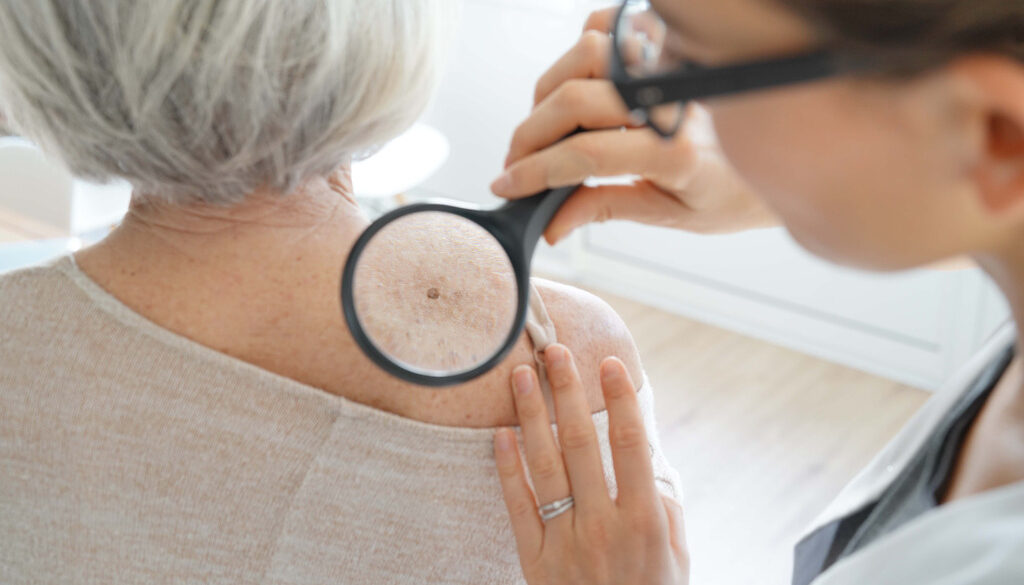How Often Should You Have a Skin Cancer Check?
Have you had more than five sunburns during your lifetime? If so, you need a skin cancer check.
Sunburns increase your risk of developing melanoma — a serious and aggressive type of skin cancer. If you’ve had more than five sunburns, your risk has doubled.
No matter how diligent you are about using sunscreen, you should always schedule regular skin cancer checks. We know that early detection can find skin cancer at its most treatable and beatable stage.
We’ll review how often you should have a skin cancer check, how to evaluate your risk, and other important information.
How Often Should You Have a Skin Cancer Check?
In line with our tailored approach to medicine, the answer often depends upon your medical and family history. However, if you generally have an average risk of skin cancer, we recommend a skin cancer check as part of your annual physical. Your primary care provider may be able to treat simple lesions in office but may refer you to a dermatologist for more complicated, concerning lesions. Some high risk patients are encouraged to see a dermatologist on a biannual basis to ensure that lesion changes are caught and treated early.
What Are the Risk Factors for Skin Cancer?
As we mentioned earlier, a blistering sunburn is one of the key risk factors for skin cancer. Those who use indoor tanning beds are also increasing their risk and need a skin cancer check more often.
Other risk factors include:
- Your skin type—those with lighter skin are at greater risk of skin cancer. (Not sure of your skin type? Take this quiz to find out)
- Unprotected sun exposure
- Family history
- If you’ve had an organ transplant
- If you have several atypical moles
If you have these risk factors, you may need a skin cancer check more than once a year.
We review these risk factors in more detail in our earlier blog.
Skin Cancer: The Alarming Facts
Skin cancer is the most common cancer in the United States. In fact, 1 in 5 Americans will develop skin cancer by the time they are 70 years old, according to information from the Skin Cancer Foundation.
Other statistics indicate:
- More than two Americans die of skin cancer every hour
- More people are diagnosed with skin cancer every year than all other cancers combined
- Around 86 percent of melanomas can be directly attributed to UV (ultraviolet) radiation from the sun
- Even just one blistering sunburn in childhood or adolescence means that your chances of developing melanoma doubles
- Indoor tanning devices also emit UV radiation—often in amounts 10 to 15 times higher than natural sunlight
However, the good news is that if melanoma is detected early, the 5-year survival rate is 99 percent.
What Do The Early Stages of Skin Cancer Look Like?
First, it’s important to be familiar with your skin. Know what any moles or freckles “normally” look like. Often, an early indicator of skin cancer is a change in appearance of these moles.
Early stages of skin cancer are reflected as flat skin patches—often with a rough, scaly appearance. They may have a reddish or brown surface.
If you have any signs of these, or a change in the appearance of a mole, schedule an appointment with us.
Raleigh Medical Groups Wants You to Know the Signs of Skin Cancer
Skin cancer is alarmingly common. Chances are that you or someone you know will be diagnosed with it. It’s vital to get skin cancer checks regularly. In the case of melanoma or other types of skin cancer, early detection can save your life.
We believe in treating the whole individual—and that means discovering health issues before they become serious problems. That’s why we offer an extensive array of services for women’s health and men’s health.
We invite you to schedule an appointment and discover why we are the provider of choice for those seeking internal medicine doctors in Raleigh.
For more than 40 years, Raleigh Medical Group has served as the Triangle area’s premier internal medicine provider. Comprised of three distinct practices: Raleigh Medical Group, Raleigh Adult Medicine and Cary Medical Group, we tailor our treatments to provide the finest personalized health care available for each stage of your adult life. Contact us to schedule an appointment.




